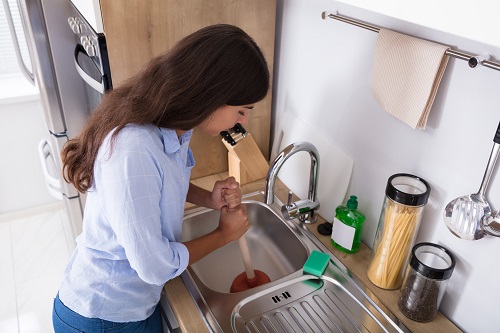There’s nothing worse than spending ages cleaning your home thoroughly, only to find that there’s a nasty smell coming from your drains. It can be off putting and embarrassing, especially if you’re about to entertain guests. A smelly drain can sometimes indicate the presence of rotting material or a clog that might cause slow drainage or even backflow problems. In more serious cases it might even mean a pipe has cracked and is leaking into the surrounding structure of your property. There are plenty of ways to make your drains smell better, however if these don’t work, it’s time to call in a professional plumber that provides drain cleaning services.
Kitchen Drain Smells
When you think about all the gunk we pour down our kitchen sinks, it’s a wonder that they don’t smell terrible all of the time. Even if you’re careful not to put oil, fats, grease, food and other material down the sink, over time small amounts of these substances can find their way into your drains, build up and line your pipes. Because it’s mostly organic waste, it’ll be highly attractive to a whole range of bacteria, which in turn will create that tell-talerotten ‘drain’ smell. Luckily these types of smells are easy to get rid of, and you can use items in your cupboard, including baking soda, salt, white vinegar and lemon juice.
Baking soda(or sodium bicarbonate)in particular is a fantastic agent for cleaning around the home and deodorising your drains, especially when combined with vinegar. This is because:
- The alkaline baking soda reacts with the acidic vinegar or lemon juice, forming the well-known ‘volcano’ effect of foaming bubbles. In a drain this can dislodge material and work its way into areas other cleaners can’t reach.
- Baking soda, like salt, is slightly abrasive, making it a great option to clean around drain entrances, removing any layers of dirt and grime.
Add a pot of boiling water into a drain, with baking soda and vinegar, and you create a potent solution that will cut through any grease and oil, as well as any other organic material such as hair that might be lurking in your pipe. Just remember to get the measurements fairly accurateas you don’t want to pour an entire box of baking soda down your drain, only to have it form a blockage – half a cup of baking soda to one cup of vinegar is a good basic guide. There are stronger drain cleaning chemicals you can buy from hardware stores and supermarkets, however for deodorising drains the chemicals you find in your cupboards work equally well.
Bathroom And Laundry Drain Smells
It’s often the case that when you move into a property after it’s been left unoccupied for any length of time, you might notice that the bathroom and laundry drains smell. This is because there may have been material in the floor waste drain that hasn’t been washed away in some time. Even floor waste drains in regularly occupied bathrooms and laundries may start to smell if they’re not getting enough water into them (for example, from a shower) to flush it out. In these cases, it may simply be a matter of pouring a jug of water into the drain to see if it helps. If the smell is still there, you will probably want to consider using the same baking soda/vinegar solution as recommended for kitchen drains.
Calling In the Professionals
If you’ve tried everything and your drains still smell terrible, it might be time to call in a plumber. Most professional plumbers can use CCTV camera technology to view your drains in real time, and find what’s causing the problem, as well as cutting edge tools and chemicals to unclog any blockages they might find. If there’s anything seriously wrong with your kitchen, bathroom or laundry drains, they’ll be able to diagnose the issue quickly and give you the most effective solution possible.







